When one GOGLA member developed a gender action plan for their distribution operations, they noticed for the first time that women were self-excluding from lease-to-own offers due to perceptions that they did not meet traditional bankable criteria such as land-ownership or other cultural aspects. This discovery changed the way they spoke to women about the product and payment plans. Women are missing out on the life-changing products available to them, and companies are losing out on business opportunities if they are not intentional about gender inclusion.
Coinciding with International Women’s Day 2024 theme of ‘Inspiring Inclusion,’ GOGLA is launching a briefing note highlighting findings from our work to apply a gender lens to the Consumer Protection Code. We want to shine a light on women consumers of off-grid solar products and services, their unique experiences and how the industry can better meet their needs, serve them and protect them.
Good standards of consumer protection mean that all consumers enjoy the same level of choice, service and support in their purchases. However, in many sectors, women are less protected as consumers. Since they are the ones experiencing the most severe effects of energy poverty and climate change, it’s particularly important for the off-grid solar (OGS) industry to address barriers to inclusion and protection. Companies should apply a gender lens to product design, marketing, sales and aftersales so they can identify and address the unique or heightened risks faced by women consumers. Meeting SDG7 (universal energy access) will require concurrent efforts to address SDG5 (gender equality).
As part of larger efforts to promote a gender-forward OGS industry, the paper highlights good practices that OGS companies can adopt to strengthen both gender inclusion and business performance.
The need for a gender lens when looking at consumer risk
Women are more vulnerable and exposed to some consumer protection risks because of both socio-economic factors, and the organisational and operational realities of the OGS industry – especially in pay-as-you-go (PAYGo) models.
Consultations with OGS companies and experts in the financial inclusion sector allowed GOGLA to identify four broad risk areas for women consumers in the off-grid solar industry:
- Lower levels of literacy, lack of digital and financial skills, and time and mobility constraints, make women more vulnerable to lack of transparency – meaning that they struggle to access information and make informed decisions about products, services and payment plans that meet their needs and preferences.
- Women may have greater exposure to over-indebtedness due to poorly designed ability-to-pay assessments that are unable to factor in the more volatile and irregular nature of many women’s income. Compounding this, entrenched human (or, increasingly, machine/AI) bias may wrongly exclude women from credit approvals – despite the fact they are often better at making repayments.
- PAYGo distribution relies heavily on mobile money payments. Women are less likely to own a phone than men, and in LMICs are 28% less likely to own their own mobile money account. While this may exclude women from making a purchase, it can also increase exposure to agent-based fraud for those who do make a purchase. Without easy access to a mobile money account, women (and others) are known to make cash payments to agents and neighbours to pay on their behalf.
- As a result of social and cultural norms and a male-dominated agent workforce, women consumers may face barriers, or lack confidence, in accessing adequate support in product maintenance or after-sales services. Aftersales and issue resolutions that address literacy gaps and time/mobility constraints can better serve the full cross-section of OGS consumers.
Safeguarding women consumers: Good practice for companies
To ensure a better consumer experience for women, companies are encouraged to be intentional about gender inclusion across the entire customer journey. Recommended good practice includes:
- Gender sensitisation and training for consumer-facing staff to help recognise biases and address entrenched gender, social and cultural norms.
- Collect, monitor and act upon sex-disaggregated data, to ensure differences in payment behaviours, product and service issues, resolution rates, and satisfaction are measured and lead to informed operational decisions. In doing so, companies are better equipped to realise the opportunity to target, serve and support women consumers.
- Improve the quality of information, services and support to reduce transparency risks and address different communication needs, styles and channels preferred by women. For many consumers, the OGS contract is the first they may have signed: ensuring that the terms and conditions are fully understood is important for both the customer and the company.
- Design for the exceptions to ensure that consumers who may not have access to a mobile money account, or required ID documentation, still have a route to access that does not expose them to additional risks such as agent fraud.
- Mainstream gender inclusion across the organisation, especially in recruitment – to increase the number of women in customer-facing roles – and in R&D initiatives that are developing AI innovations – to ensure that models do not replicate entrenched human biases present in data and systems used to train them.
For more information, we encourage you to check out the Briefing Note, “Consumer protection and women: Why it makes sense for Off-Grid Solar companies to adopt a gender-forward approach to operations”.
GOGLA invites all consumer-facing organisations within the off-grid solar sector to make a commitment to the Consumer Protection Code so that together, we can create a sustainable, consumer-centric industry. Committing is only the first step in a company’s consumer protection journey, and we are building a toolbox to help the implementation of continuous operational improvements, including in gender inclusion.

